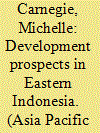|
|
|
Sort Order |
|
|
|
Items / Page
|
|
|
|
|
|
|
| Srl | Item |
| 1 |
ID:
169136


|
|
|
|
|
| Summary/Abstract |
It appears that an almost unquestioned development pathway for achieving gender equity and women's empowerment has taken centre stage in mainstream development. This pathway focuses on economic outcomes that are assumed to be achieved by increasing women's access to material things, including cash income, loans, physical assets, and to markets. Gender equity indicators, which measure progress towards these outcomes, cannot escape reinforcing them. We argue that far from being neutral, indicators are embedded in political and ideological agendas that serve as guides to the appropriate conduct of those whose performance or behaviour is being measured. Drawing on participatory feminist, diverse economies and strengths based approaches, we outline a research methodology for developing community‐based indicators that recognises women's and men's participation and relationships in all spheres of life, including the ‘non‐economic’. If indicators are grounded in local meanings and realities, we propose that community members can use them to identify aspirational goals for gender equity, and measure progress towards these goals.
|
|
|
|
|
|
|
|
|
|
|
|
|
|
|
|
| 2 |
ID:
083851


|
|
|
|
|
| Publication |
2008.
|
| Summary/Abstract |
This paper explores the effects of different representations of informal economies in Third World settings. Both the neoclassical and political economy approaches have represented the informal economy as a transient entity, and the non-capitalist practices it comprises as being remnant economic forms, or as already capitalist. Mainstream development discourse (that reflects the neoliberal paradigm) continues to ignore the value and potential of non-capitalist practices and to represent them as inconsequential to development outcomes. Meanwhile contemporary livelihood studies across the social sciences have documented the continuing vibrancy of different and hybrid economic forms in the Asia Pacific. In this paper, I use a diverse-economies approach to explore the complexities of the village economy of Oelua in Rote, in the so-called lagging region of Eastern Indonesia. Drawing on anti-essentialist Marxist theory in economic geography, I describe the multiple, locally specific and coexisting practices that comprise Oelua's diverse economy, which include distributions of surplus labour to promote social and economic well-being. I argue that recognising informal village economies as an important development resource could begin a process of building diverse development trajectories in Eastern Indonesia, complementing mainstream development proposals to attract foreign direct investment, shore up development assistance and source out-migration.
|
|
|
|
|
|
|
|
|
|
|
|
|
|
|
|
| 3 |
ID:
099067


|
|
|
|
|
| Publication |
2010.
|
| Summary/Abstract |
Much research has sought to understand why mixed communities in Indonesia have been torn apart by violent conflict. By contrast, little is known about how people live together successfully in the mixed, low-conflict communities that exist in abundance throughout the Indonesian archipelago. This paper explores the inter-communal relations in the multiethnic, Christian-Muslim coastal village of Oelua in Roti, Nusa Tenggara Timur province. Mechanisms of agreement across ethnic, religious and livelihood differences have shaped and reproduced a low-conflict community - including transfers of land, labour, technology and surplus; use of customary law and conflict management; and social mixing and interpersonal relations. The findings suggest that there are lessons to be learned from communities like Oelua about how to foster social and economic inclusion, which could inform national and regional political agendas concerned with governing difference in a post-New Order Indonesia.
|
|
|
|
|
|
|
|
|
|
|
|
|
|
|
|
|
|
|
|
|